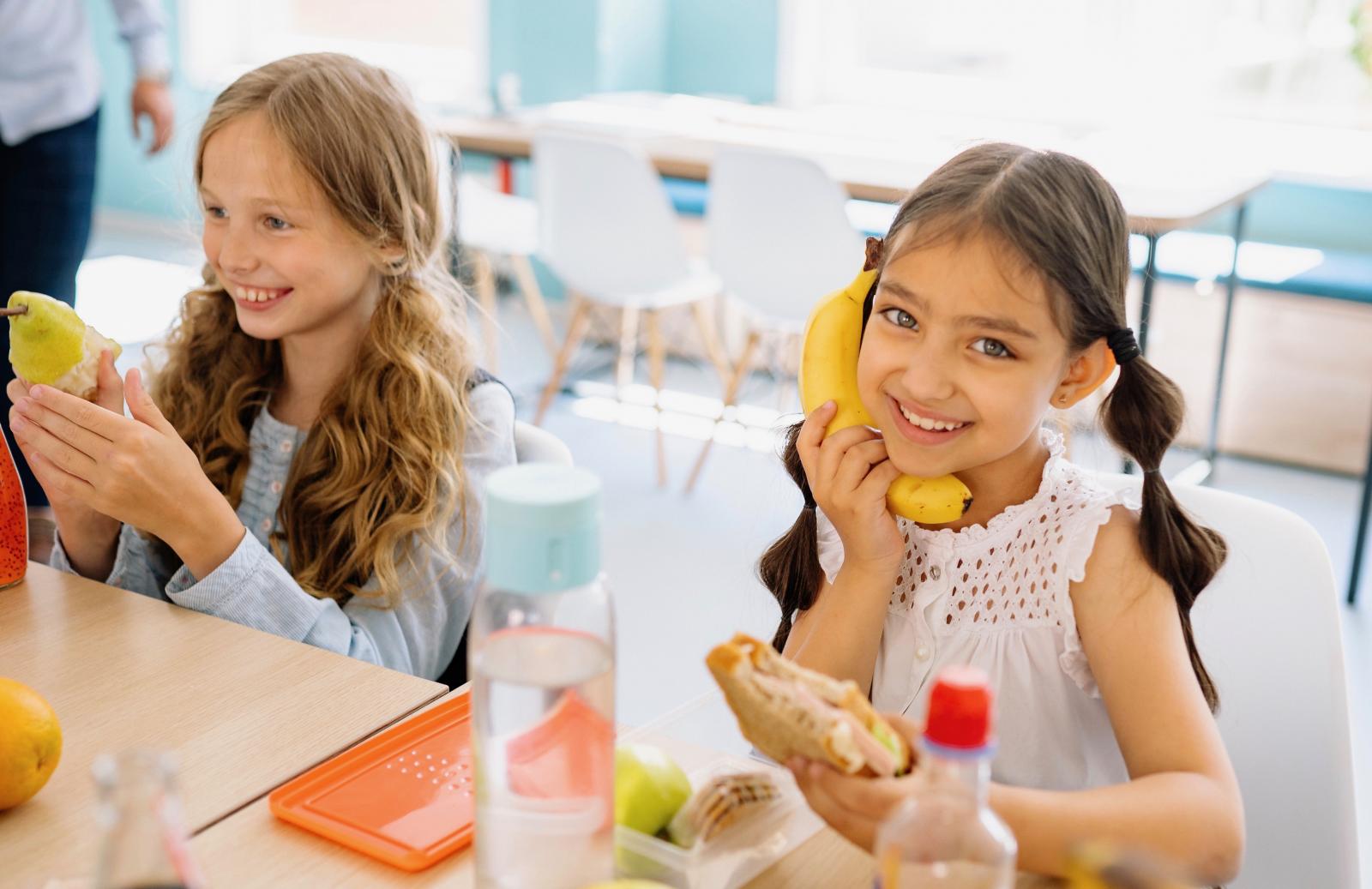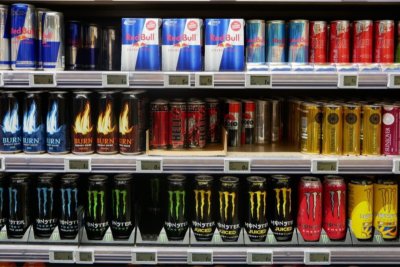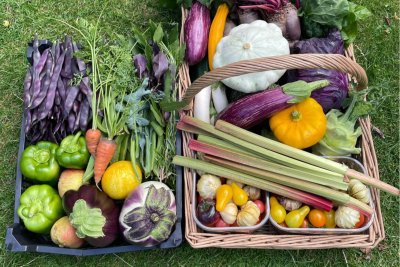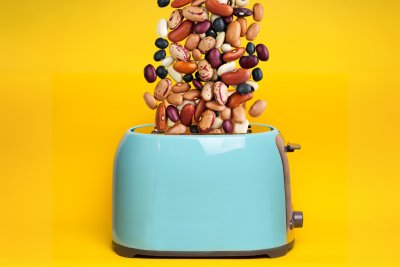Blogs • Children's Food Campaign
What could 2022 bring for children’s food?
2021 was a year of highs and lows for children’s food, but what juicy morsels might 2022 serve up? Children’s Food Campaign Co-ordinator Barbara Crowther takes a look at the year ahead and finds out what key partners would like to see happen.

There are plenty of signs that 2022 could turn out to be a big year for tackling healthy food and food insecurity for children – from school food to junk food marketing.
Will we get a new Food Bill in 2022?
In response to the National Food Strategy, a new government white paper is expected to be published in the early part of the year – with big themes around breaking the junk food cycle, tackling dietary inequalities, mandatory food business reporting and supporting a high welfare and climate resilient food and farming system. Many Sustain and Children’s Food Campaign partners believe there is huge potential for public sector food procurement to lead the way, and Sustain’s Kath Dalmeny has set out the case for bringing forward a new Food Bill in 2022 to create an integrated food system approach.
When I asked Children’s Food Campaign partners for their big wishes for 2022, this also came top of the wish list for Laura Chan of Soil Association:
“A National Food Strategy white paper response that stands up to and delivers on transforming the broken food system. I hope government seizes this unique opportunity in 2022 and is galvanised by the universal support they have to make a real change for our health, children’s health and the health of the planet.”
How can 2022 help break the junk food cycle?
There is no doubt that 2022 is set to change the landscape in relation to food advertising and in-store promotions, thanks to two pieces of legislation that were making their way through Parliament at the end of 2021. From October 2022, new restrictions will end the use of multi-buy deals and prominent displays of products high in fat, salt and/or sugar (HFSS) for a number of food and drink categories.
During the first part of 2022, the Health and Social Care Bill will make its way through the Lords, before returning to the Commons for final voting, and it includes the introduction of a 9pm watershed and total online advertising ban for some HFSS food and drink. For Caroline Cerny of the Obesity Health Alliance, finally securing significant protection for children from junk food adverts on TV and online is the best gift for children’s food in 2022:
“After more than ten years of campaigning, these new restrictions will go a long way to taking unhealthy food out of the spotlight. They may not be perfect (with significant exemptions) but set an important precedent to build on in the future.”
Young people are also looking forward to the new marketing restrictions coming into force and more healthy food being in the spotlight in 2022. 16 year old Dev Sharma, a member of the UK Youth Parliament, co-chair of Bite Back 2030's Youth Board and young ambassador for the Food Foundation says:
"I hope in 2022, young people and our health doesn’t continue to be object of political discussion. Instead, we want a seat at the table and to help make the best decisions for us and a healthier future. I am excited to see the amendment to end junk food advertising go through the Commons later this year and officially become policy. My social media feed is bombarded with junk food advertising and I hope 2022 will be the year healthy options are finally given a starring role."
How companies respond to the new regulations is also something that Matt Towner of Impact on Urban Health will be watching for in 2022:
“I’d like for the HFSS restrictions to be implemented effectively, with companies sticking to the spirit of the regulations intended to improve health, and Government acting to close loopholes.”
Also pushing the Government to go further to address the ongoing loopholes in junk food marketing regulations is a topic shared by other Children’s Food Campaign partners. Sports sponsorship and brand-only advertising are amongst the areas where we see companies increasing junk food marketing activity, as Beth Bradshaw of Food Active warns, and wants to see further action in 2022:
“Kicking junk food out of sport. It’s high time children, young people and adults can enjoy sport without unhealthy food and drink being flogged to them or see global sports stars using their platform and influence to promote them to their adoring fans.” Food Active and Children’s Food Campaign’s recent report Kicking Junk Food out of Sport highlights a series of detailed recommendations for government, sports bodies and personalities and local authorities to address the continuing ‘sportswashing’ of less healthy food and drink brands."
The use of children’s characters on unhealthy food and drink packaging is also a topic that Children’s Food Campaign member organisations, as well as parents, have expressed serious concern about in terms of mixed messaging about the suitability of these products in children’s diets. Dr Kawther Hashem of Action on Sugar thinks this should be put centre stage as the government explores the next steps in its healthy weight strategy in 2022.
“Wouldn’t it be amazing if we start 2022 with only healthier products, lower in fat, salt and sugar, featuring child-friendly packaging? I would like to see the government take the issue of product packaging targeted towards children seriously. For far too long we have made it the norm for parents to battle with their little ones in supermarkets over the bright, colourful, full of famous cartoon characters placed at eye-level, plastered on unhealthy products such as sweets, chocolates and breakfast cereals. All parents would appreciate one less stress when shopping. It is time to just see child-friendly packaging on healthy products, that are nourishing and help set good food and drink habits for a lifetime.”
One opportunity in 2022 for the government to do exactly that will be with the launch of the new consultation on marketing and labelling of food and drink products for early years children. Dr Vicky Sibson of First Steps Nutrition is hopeful that this could finally start to change the tide of misleading healthy claims on products containing high levels of free sugars or other additives.
“We hope to see decisive, comprehensive and coherent guidance from the DHSC on baby food composition and the marketing and labelling of foods and drinks intended for infants and young children, which need to fully align with and support public health policy on feeding practices for the under 3s. We hope the baby food industry will respond to this guidance appropriately, therefore enabling the parents of babies and toddlers to make more informed decisions about what they feed them, and to better protect their health both in the short and long term.”
Beyond marketing, the issue of incentivising business to make healthier products in the first place is going to stay high on our own agenda. One of the key recommendations from the National Food Strategy was the extension of further reformulation taxes for products high in sugar and salt, and this is something that Children’s Food Campaign itself will be focussing on during 2022, as well as being an agreed priority in the Obesity Health Alliance’s new Healthy Weight Strategy Turning the Tide. Ensuring a new Food Bill, or the government’s formal response keeps the door firmly open for further fiscal measures to play their role in making children’s food healthier, is going to be critical to success, as I argued live at Sustain’s Annual Conference at the end of 2021. Whether new levies target specific categories such as confectionery or are modelled to work across all processed food and drink, remains to be seen. At the very least, we’ve argued that unhealthy snacking must now come into scope of government reformulation and tax measures.
For Sustain’s deputy CEO Ben Reynolds, there is also a bigger conversation around healthy and unhealthy snacking needed now:
“We need to reset the thinking around treats. A big national conversation is overdue on how we can rein in our love of snacking and what responsibilities we all have to help our children to do so – parents, schools, businesses, government.”
Katharine Jenner of Action on Sugar and Action on Salt would also like companies to just quietly get on with the business of healthy food and drink reformulation themselves.
“I don’t want to see this happen – I want it to be done without even noticing! For all producers to lower the ‘unhealthy’ components (eg. saturated fats, trans fats, sugar, salt) of all of their food and drinks, and increase to the healthy, sustainable ones. All without it becoming a ‘health wash’ gimmick, please!”
How can 2022 deliver good school food for ALL children?
Given children typically spend 190 days of every year in school (and let’s hope that is the case in 2022 after two years of pandemic disruption), it’s no surprise that for many Children’s Food Campaign partners, that is the place they would like to see more change in 2022.
Asha, 15, is a Young Food Ambassador for the ChildrensRight2Food campaign led by our partners at the Food Foundation.
“I went without food a lot of the time in primary school as I’ve only just started accessing Free School Meals. The change I want to see is to get rid of the stigma behind Free School Meals, as it’s just awful. If attitudes change then policy will too. I want our government to listen to us young people and understand how important it is for every child to have a healthy diet every day. I want 2022 to be the year that we really DO something about children missing out.”
We couldn’t agree more.
Scotland and Wales made landmark commitments in 2021 to start to roll out universal free school meals in all primary schools. We believe 2022 is the year governments in England and Northern Ireland need to act, otherwise they risk being left behind in terms of fair and equal access to healthy school food. As Kate Anstey of Child Poverty Action Group told Sustain’s Annual Conference in December 2021, the current system of eligibility for free school meals is wholly inadequate, with an estimated one million children living below the poverty line still excluded. She argues this has to be top of the food movement’s agenda for the coming year:
“It can’t be right that children living on such a low income miss out on the benefits of a free school meal… Education and school is supposed to be free to access across the UK, it is meant to be a great leveller for children, but school food comes with a great cost to families. If we want our children to thrive and make the most of school, then I ask why we stop providing food for children and make them pay. Universal school meals should be one part of the school experience, and it needs to be universal because once there is a means test in place, we know that children will miss out…. Wales and Scotland are on the right track… but Northern Ireland and England are falling behind. Once these policies are implemented in the other nations, England will have the harshest or least generous schools meals policy, and England will be the poor relation.”
You can read more about CPAG’s case for expanding free school meals here.
Expanding school meal eligibility is one of five areas of change that Children’s Food Campaign and partners are urging the government to explore as part of a comprehensive school food review, so that no child misses out on nutritious food at school. This goes beyond simply providing food, to addressing the funding structures, the quality of food, the delivery of nutrition education and that all of these are properly enforced and monitored. Whilst many schools do excellent work in providing tasty nutritious meals, accompanied by food education, food growing spaces and whole school healthy eating policies, this is far from assured, as Bite Back 2030’s recent research panels with secondary school pupils has shown in their report Spill the Beans.
It’s no surprise therefore, that young people themselves want to be at the forefront of school food campaigning. For 2022, Christina Adane, co-chair of Bite Back 2030’s Youth Board says:
“The most exciting thing I would most like to see is to see more young people fronting campaigns and for school meal standards to be properly enforced!”
Her views are echoed strongly by Stephanie Slater of School Food Matters:
“If schools and their catering teams are required to produce an annual school food report, with input from pupils, this would ensure that school food is nutritious, enjoyable, is part of a healthy school environment and provides good value for money. We’d like all school governing bodies to be required to publish their school's food policy and action plan which would be 'required evidence’ for Ofsted inspectors. I can but dream!”
Dan Parker of Living Loud also wants to see a healthy food education revolution in all our schools. He says:
“Teaching children to be healthy should be an essential objective of primary education. That means teaching about food by teaching with food. Every primary aged pupil should enjoy the chance to grow, to cook, and to taste real food.”
This topic of growing real food and connecting children’s experience of food in school with its origin and source is echoed by Kath Dalmeny, Sustain’s CEO, who wants
“every school to have a food growing space, where children can learn about soil, sun, water, insects and plants, and where their food comes from, and enjoy eating (literally) the fruits of their labours.”
Meanwhile, Cecily Spelling of Sustain's Food Poverty campaign would like more opportunities connecting schoolchildren to the farmers who produce their food:
“Food sourced from local farmers and food growers with the addition of farm visits for each class so they get to see where their food is grown, what is involved and better make the connection between farm and fork.”
Time for action in 2022
Cecily Spelling believes we need to rethink our language around ‘food poverty’ and ‘food insecurity’ in 2022, for a more holistic concept of all being able to access good food. Her vision is
“for the narrative around food security to be replaced with nutrition security. This will better reflect the needs of children and their families. This could lead to improvements in children’s food provision at school and through holiday programmes, reduce junk food aid to food banks and maybe even reduce junk food advertising given a new nutrient focus."
Finally, as Cath Elliston of the Jamie Oliver Organisation reminds us, if 2022 could clean up areas of unfinished business still outstanding in the government’s childhood obesity and school food strategies, that would make 2022 a good year:
“I’d love to see all of the policies that have been slowly making their way through parliament, or stuck on the Government’s to-do list, actually implemented. Positive noises on school food standards enforcement or restricting the sale of energy drinks to under 16s aren’t enough. It’s time for action: ironically, the proof of this Government’s record on child health and access to nutritious food will be in the pudding.”
Your thoughts?
What is your top wish for transforming children’s food in 2022? Any thoughts on the ideas shared here? What have we missed?
Join the conversation on Twitter and Facebook – and don’t forget to tag us @childrensfood or hashtag #childrensfood2022 so we can read and share your thoughts too!
Published Tuesday 4 January 2022
Children's Food Campaign: Better food and food teaching for children in schools, and protection of children from junk food marketing are the aims of Sustain's high-profile Children's Food Campaign. We also want clear food labelling that can be understood by everyone, including children.





